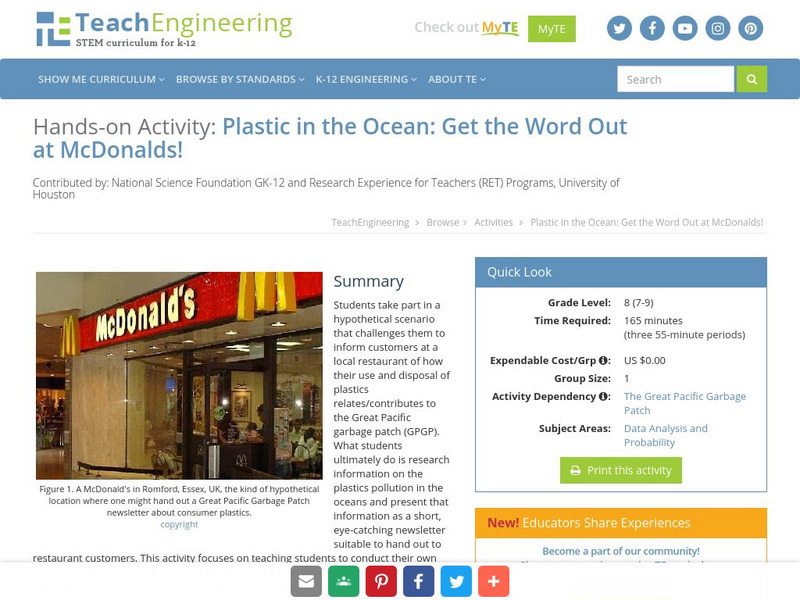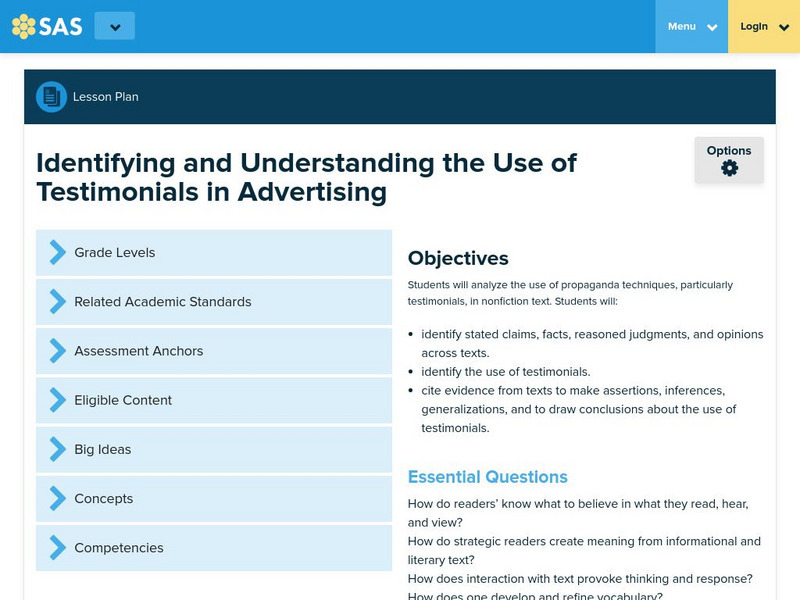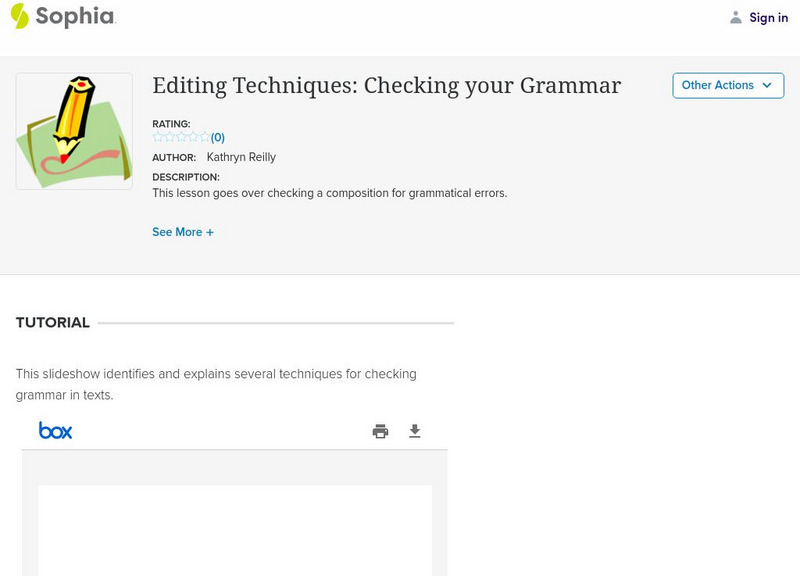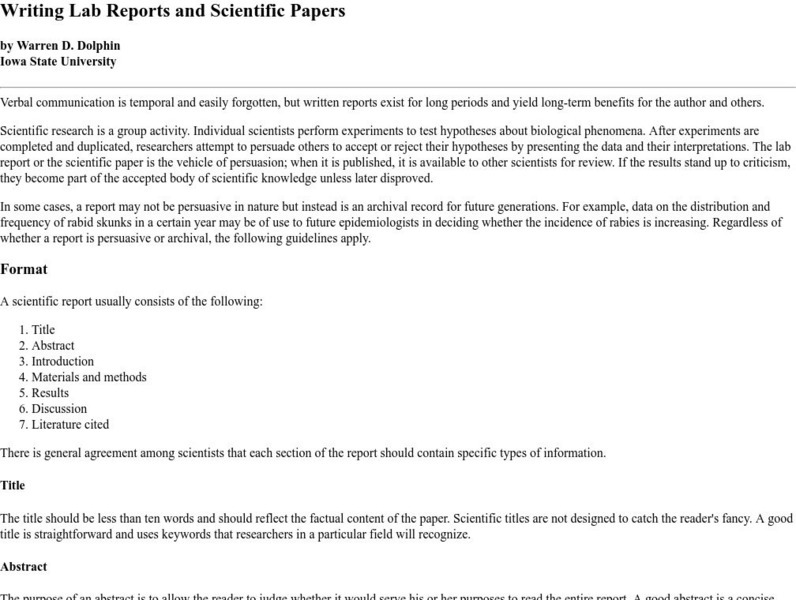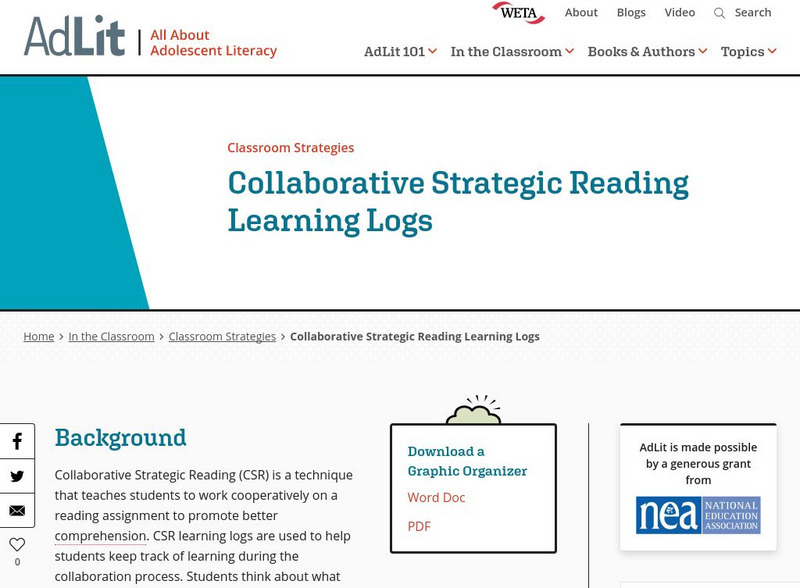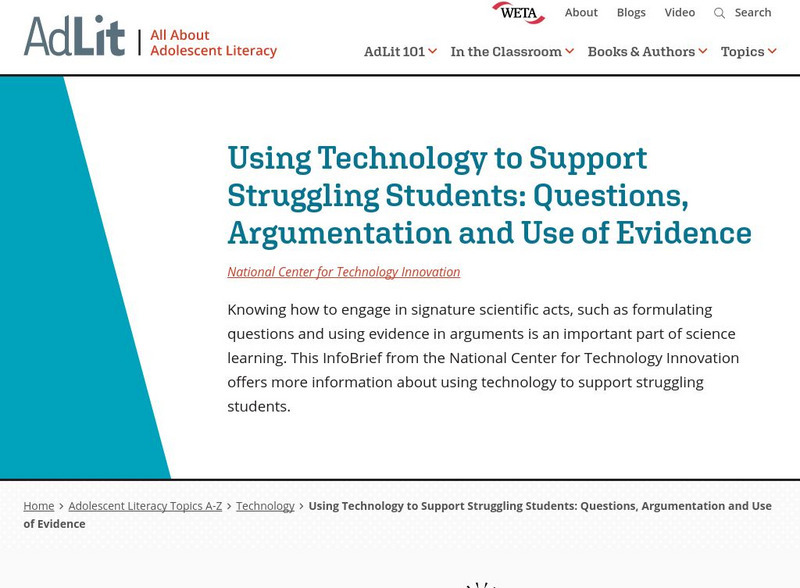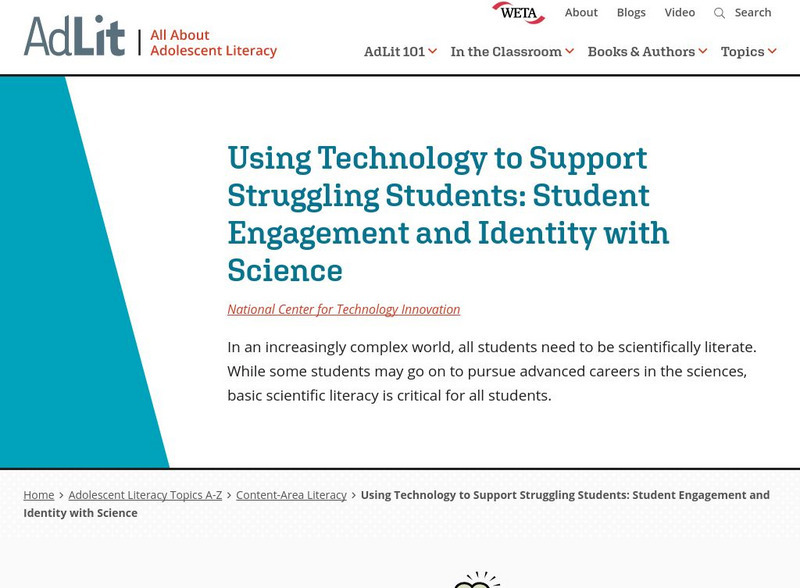TeachEngineering
Teach Engineering: Get the Word Out at Mc Donalds!
Students take part in a hypothetical scenario that challenges them to inform customers at a local restaurant of how their use and disposal of plastics relates/contributes to the Great Pacific garbage patch (GPGP). What students...
Other
Pde: Sas: Identifying and Understanding Use of Testimonials in Advertising
In this lesson, 8th graders analyze and compare the propaganda techniques used in informational texts, with a particular focus on the use of testimonials. Includes links to recommended resources, scaffolding suggestions, and an...
Sophia Learning
Sophia: Editing Techniques: Checking Your Grammar
This slideshow tutorial focuses on editing techniques for grammar and mechanical errors; it states three ways that grammar should be reviewed in papers: Microsoft Word's grammar check, review each sentence backwards, and have peer or...
Other
Critical Thinking Community: Remodeling Lessons Grades 6 9
Learn to re-model your lesson plans to include room for critical thought and higher levels of learning. Re-modeled lessons cite specific critical thinking strategies. Wonderful examples include "Human Migration," "Integrated Grammar,"...
Other
Association for Educational Communications & Technology: Learning From Tv
Research regarding what is internalized and learned from television and the responsibility parents and educators have helping students to decipher between reality and fabrication. Media literacy, or how a viewer perceives what they are...
Other
Lumen Learning: Memorandums
This site discusses the purpose and format of a memo and helps understand effective strategies for business memos.
Colorado State University
Colorado State University: The Wac Clearinghouse
Although this site is primarily designed for instructors at the post-secondary level, the information and suggestions given can also be used, with only minor changes, at the high school or middle school levels as well. Learn ways for...
Texas Education Agency
Texas Gateway: Evaluate Graphics in Informational/procedural Text
[Accessible by TX Educators. Free Registration/Login Required] In this lesson, you will learn to explain the function of the graphical components. You will also learn to evaluate graphics on how well they do what they are intended to do.
Buck Institute
Buck Institute for Education: 6 8 Presentation Rubric (Ccss Aligned)
[Free Registration/Login Required] This rubric helps teachers guide students in grades 6-8 in making effective presentations in a project, and it can be used to assess their performance. Alignment with CCSS is not noted. It describes an...
McGraw Hill
Writing Lab Reports and Scientific Papers
This site list and describes the seven pieces necessary for a lab report.
National Science Teachers Association
Nsta: Science & Engineering Practices: Obtaining, Evaluating, Communication
This site from NSTA includes a progression of the Science and Engineering Practice for obtaining, evaluating, and communicating information. In addition, thereare performance expectations that make use science and engineering practices.
Texas Education Agency
Texas Gateway: Analyze Texts With Similar/different Purposes
[Accessible by TX Educators. Free Registration/Login Required] This lesson is about being able to identify the author's purpose in a specific text. Specifically, it's about looking at several authors' works on the same topic and...
PBS
Pbs Learning Media: The Zombie Autopsies: Publish or Perish, for Real
An excellent lesson where students are guided in how to write an article for publication in a scientific journal. Includes downloadable lesson and student handout.
PBS
Pbs Learning Media: Mechanical Waves
Learn about mechanical waves, which transfers energy from one place to another through liquids, gases and solids, with this interactive lesson.
PBS
Pbs Learning Media: Out of Proportion
Students are asked to explain how natural disasters affect environmental health.
AdLit
Ad lit.org: Classroom Strategies: Collaborative Strategic Reading Learning Logs
Collaborative Strategic Reading (CSR) is a technique that teaches students to work cooperatively on a reading assignment to promote better comprehension. CSR learning logs are used to help students keep track of learning during the...
AdLit
Ad lit.org: Classroom Strategies: Mnemonics
A mnemonic is an instructional strategy designed to help students improve their memory of important information. This technique connects new learning to prior knowledge through the use of visual and/or acoustic cues. The basic types of...
AdLit
Ad lit.org: Classroom Strategies: Inquiry Charts (I Charts)
The Inquiry Chart (I-Chart) is a strategy that enables students to generate meaningful questions about a topic and organize their writing. Students integrate prior knowledge or thoughts about the topic with additional information found...
AdLit
Ad lit.org: Improve Performance on Reading Comprehension Tests
This article describes some of the thought processes that can help students perform well on standardized tests of reading comprehension. It includes two reading passages along with sample test questions that call on skills that eighth...
AdLit
Ad lit.org: Using Technology to Support Struggling Students
Knowing how to engage in signature scientific acts, such as formulating questions and using evidence in arguments is an important part of science learning. This InfoBrief from the National Center for Technology Innovation offers more...
AdLit
Ad lit.org: Using Technology to Support Struggling Students
Science learning often involves creating abstract representations and models of processes that we are unable to observe with the naked eye. Learn more about visualizing, representing, and modeling to aid struggling learners.
AdLit
Ad lit.org: Using Technology to Support Struggling Students
In an increasingly complex world, all students need to be scientifically literate. While some students may go on to pursue advanced careers in the sciences, basic scientific literacy is critical for all students.
AdLit
Ad lit.org: Content Area Literacy: Science
The demands of comprehending scientific text are discipline specific and are best learned by supporting students in learning how to read a wide range of scientific genres. Besides text structures emphasizing cause and effect, sequencing...
AdLit
Ad lit.org: Assistive Technology Tools: Reading
Learn about assistive technology tools - from audiobooks to variable-speed tape recorders - that help students with reading.


